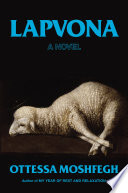Griffitt: ‘Lapvona’ is Ottessa Moshfegh’s most depraved novel

Moshfegh exploits deplorable human nature through the unsettling fiction ‘Lapvona.’
October 10, 2022
Often, books are used by many people as a means to escape the cruelties of the modern-day world. The words on the pages help the reader to relax, removing the negativity from their mind. However, Ottessa Moshfegh, a notorious gore writer, finds no problem in making her readers uncomfortable. In her 2022 novel, “Lapvona,” Moshfegh brings the cruelty of a fictional medieval village to life on the pages. This novel delves deep into how unruly, disgusting and greedy humans were capable of becoming when left in a state of sacrilegious ruling.
Moshfegh writes of a motherless 13-year-old boy named Marek and follows his rise to power from an impoverished and abused orphan to the position of king of Lapvona. Moshfegh writes in a third-person view, which helps readers feel as if they are there witnessing the horror as if it were happening right in front of them. She opens the novel with the pillage of Marek’s village on Easter. We follow Marek throughout the village as he walks through the slaughter. Through the glares and side glances of villagers, we are quickly informed of Marek’s disability and disfigurement, which causes the villagers to view Marek as a bad omen.
By page 21 in the novel, when Marek suckles on the teat of a lamb, believing it as an act of holiness, it is evident to anyone how deranged a read “Lapvona” will be.
“He felt this was his right as a child of God,” Moshfegh wrote.
Jude, Marek’s brutish father and shepherd, degrades Marek and beats him, and through this beating readers are informed Marek views this type of experience as a way to become closer to God.
Jude also continuously reminds Marek of his mother, who he describes as a holy and good mother who died in childbirth. We later learn Marek’s mother has not died but had escaped Jude’s abuse, after birthing Marek, to a Convent just out of Lapvona.
With the absence of a mother figure, Marek tries to find a surrogate. He finds this in Ina, a witchy wet nurse who resides in the woods. Ina is where this novel begins to stray from reality to fiction. Ina, who was previously blinded from a plague, strangely gains the ability to see when she allows the children to feed.
Through a plot convenience, Marek begins living with Villiam, the gluttonous and emotionally stunted King of Lapvona. While Marek lives in a castle as the new prince, a drought washes through the already suffering people of Lapvona, and Marek begins to experience the corruption of Villiam’s power.
The drought in Lapvona is where Mosfegh begins to bring out the horror of desperation among humans. The people are driven crazy; they begin to cannibalize anyone that has died; Ina is unable to produce any more milk, thus becoming completely blind, and is driven to a point where she gouges out a horse’s eyes just to be able to see again. She even shows the true corruption of Villaim’s power, revealing him as the source of the drought. While he is drowning in supplies, the people of Lapvona are driven to cannibalism.
As the novel continues, more horror ensues. After a long reign of terror, Villiam dies, and Marek is given the crown of the king. This novel ends with no resolution to the horror that was previously birthed. No one is given a happy ending, not even Marek, who is an outcast even as king.
Mosfegh’s past books have always had some humanity in them, something she can use to relate her readers to the character to mock the human experience. However, Lapvona feels entirely void of this humanity. She delves into the disgusting and shameful parts of humanity we have always shied away from. This novel is not for anyone looking for an enjoyable read, but one where the readers experience an exaggerated telling of a corrupted village.







